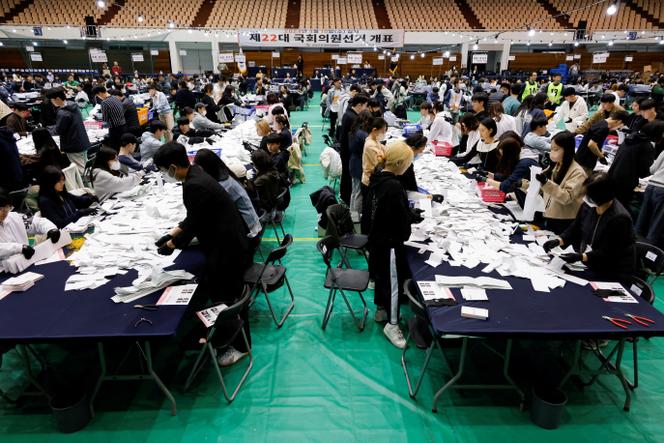
South Korea's prime minister and senior presidential officials offered to resign en masse on Thursday, April 11, after their ruling party suffered a crushing defeat in parliamentary elections in a huge blow to conservative President Yoon Suk Yeol.
The results of Wednesday's elections mean the liberal opposition forces will prolong their control of parliament until after Yoon completes his single five-year term in 2027. That will likely set back Yoon's domestic agenda and weaken his grip on the ruling party as he faces the opposition's intensifying political offensive during his remaining three years in office, experts say.
Prime Minister Han Duck-soo and all senior presidential advisers to Yoon, except those in charge of security issues, submitted their resignations, according to Yoon's office. It didn't immediately say whether Yoon accepted them. Executive power in South Korea is heavily concentrated in the president, but the prime minister is the No. 2 official and leads the country if the president becomes incapacitated.
Yoon said he will "humbly uphold" the public sentiments reflected in the election outcome and focus on improving people's economic situations and on reforming state affairs, said Yoon's presidential chief of staff, Lee Kwan-seop, in a televised briefing.
In a separate news conference, ruling People Power Party leader Han Dong-hoon said he would step down as well to take responsibility for the election defeat. "I apologize to the people on behalf of our party, which wasn't good enough to win the people's choices," he said.
Yoon will remain in power
With most of the votes counted, the main opposition Democratic Party and its satellite party appeared to have won a combined 175 seats in the 300-member National Assembly. Another small liberal opposition party was expected to win 12 seats under a proportional representation system, according to South Korean media tallies.
Yoon's ruling People Power Party and its satellite party were projected to have obtained 108 seats. The final official results were expected later on Thursday. Regardless, Yoon will stay in power and his major foreign policies will likely be unchanged. But Wednesday's elections were widely seen as a midterm confidence vote on Yoon, a former top prosecutor who took office in 2022.
Yoon has pushed hard to boost cooperation with the United States and Japan as a way to address a mix of tough security and economic challenges. But he has been grappling with low approval ratings at home and a liberal opposition-controlled National Assembly that has limited his major policy platforms that require legislative approval.
Hong Sung Gul, a public administration expert at Seoul's Kookmin University, said Yoon will likely find it more difficult to implement business-friendly policies and tax reforms, as the opposition parties are likely to aggressively flex their legislative muscles. "When it comes to policies, important ones like tax system reforms require legislation. I think there is a high possibility for the opposition parties to put a break on Yoon's such policy agendas," Hong said.
Yoon's critics have accused him of failing to resolve livelihood issues such as soaring prices, refusing to quickly fire some top officials implicated in scandals, and lacking efforts to communicate with opposition leaders for policy coordination.